修饰比较级的词有哪些 口诀是什么
比较级和最高级的修饰词掌握修饰比较级和最高级的形容词和副词

比较级和最高级的修饰词掌握修饰比较级和最高级的形容词和副词比较级和最高级的修饰词:掌握修饰比较级和最高级的形容词和副词比较级和最高级是英语中用于比较两个或多个事物之间差异和程度的词汇形式。
在句子中,形容词和副词通常用于修饰名词和动词,而比较级和最高级的修饰词则用于进一步描述这些形容词和副词的程度或差异。
一、形容词的比较级和最高级形容词的比较级用于比较两个事物之间的程度差异,最高级则用于比较三个或更多事物之间的程度差异。
形容词的比较级和最高级的构成规则如下:1. 单音节形容词:- 比较级:在形容词后加-er,如taller(更高的)- 最高级:在形容词后加-est,如tallest(最高的)2. 以字母e结尾的形容词:- 比较级:在形容词后加-r,如braver(更勇敢的)- 最高级:在形容词后加-st,如bravest(最勇敢的)3. 以辅音字母+y结尾的形容词:- 比较级:将“y”改为“i”,加-er,如busier(更忙的)- 最高级:将“y”改为“i”,加-est,如busiest(最忙的)4. 多音节形容词和部分双音节形容词:- 比较级:在形容词前加more(更...的),如more beautiful(更美丽的)- 最高级:在形容词前加most(最...的),如most beautiful(最美丽的)值得注意的是,有一些形容词的比较级和最高级形式是不规则变化的,需要特殊记忆,比如good(好)的比较级为better(更好的),最高级为best(最好的)。
二、副词的比较级和最高级副词的比较级和最高级的构成方式与形容词类似,不同的是它们要在副词前加上more或most。
比较级用于比较两个动作或状态之间的程度差异,最高级则用于比较三个或更多动作或状态之间的程度差异。
比较级和最高级的构成规则如下:1. 单音节副词和部分双音节副词:- 比较级:在副词前加更(更...地),如faster(更快地)- 最高级:在副词前加most(最...地),如fastest(最快地)2. 多音节副词和以-ly结尾的副词:- 比较级:在副词前加more(更...地),如carefully(更小心地)- 最高级:在副词前加most(最...地),如most carefully(最小心地)需要注意的是,有一些副词的比较级和最高级形式也是不规则变化的,比如well(好)的比较级为better(更好地),最高级为best(最好地)。
(完整版)小学英语形容词比较级顺口溜
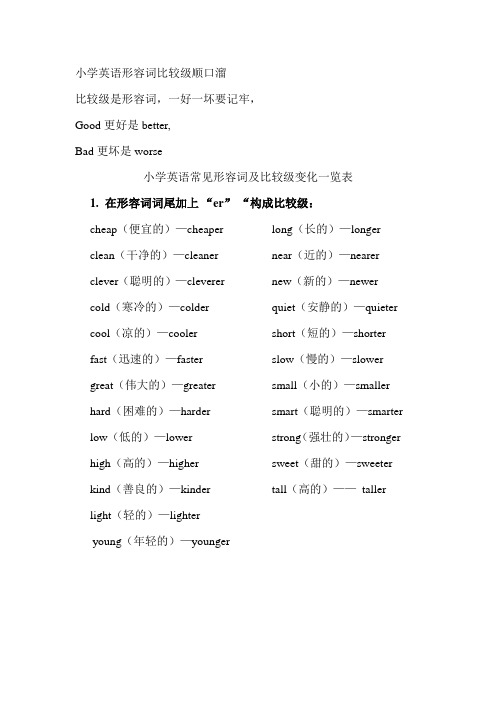
小学英语形容词比较级顺口溜比较级是形容词,一好一坏要记牢,Good更好是better,Bad更坏是worse小学英语常见形容词及比较级变化一览表1.在形容词词尾加上“er”“构成比较级:cheap(便宜的)—cheaper clean(干净的)—cleaner clever(聪明的)—cleverer cold(寒冷的)—colder cool(凉的)—cooler fast(迅速的)—faster great(伟大的)—greater hard(困难的)—harder low(低的)—lowerhigh(高的)—higher kind(善良的)—kinder light(轻的)—lighter long(长的)—longernear(近的)—nearer new(新的)—newerquiet(安静的)—quieter short(短的)—shorter slow(慢的)—slower small(小的)—smaller smart(聪明的)—smarter strong(强壮的)—stronger sweet(甜的)—sweetertall(高的)——talleryoung(年轻的)—younger2.双写最后一个字母,再加上“er”构成比较级:big(大的)—bigger fat(胖的)—fatterhot(热的)—hotter sad(伤心的)—sadder thin(瘦的)—thinner3.以不发音的字母e结尾的形容词,加上“r”构成比较级:close(接近的)—closer fine(好的)—finerlarge(巨大的)—larger late(迟的)—laternice(好的)—nicerwhite(白的)—whiter3.以字母y结尾的形容词,把y改为i,再加上“er”构成比较级:busy(忙碌的)—busier early(早的)—earlier easy(容易的)—easier friendly(友好的)—friendlier pretty(美丽的)—prettier funny(好玩的)—funnier happy(开心的)—happier healthy(健康的)—healthier heavy(重的)—heavier hungry(饿的)—hungrier lazy(懒惰的)—lazier lucky(幸运的)—luckier4.noisy(嘈杂的)—noisier 不规则变化的形容词:bad(坏的)—worse good(好的)—better far(远的)—farther ill(病的)—worse little(少的)—lessmany(多的)—more much well(好的)—betterold(年老的)—older5.在单词前面加上“more”构成比较级:afraid(害怕的)—more afraidbeautiful(美丽的)—more beautifuldelicious(美味的)—more deliciousexciting(令人兴奋的)—more excitingexpensive(昂贵的)—more expensivehard-working(勤奋的)—more hard-workinghelpful(有帮助的)—more helpfulinteresting(有趣的)—more interestingpolite(有礼貌的)—more politetired(累的)—more tired询问某人的身高:How tall +be动词+主语例如:How tall is your brother?(你的弟弟有多高?)He is 1.7 metres. (他有1.7米) 1.7(one point seven)询问某人的体重:How heavy +be动词+主语例如:How heavy is he?(你有多重?)He is 49 kilograms.(他有49公斤)。
比较级
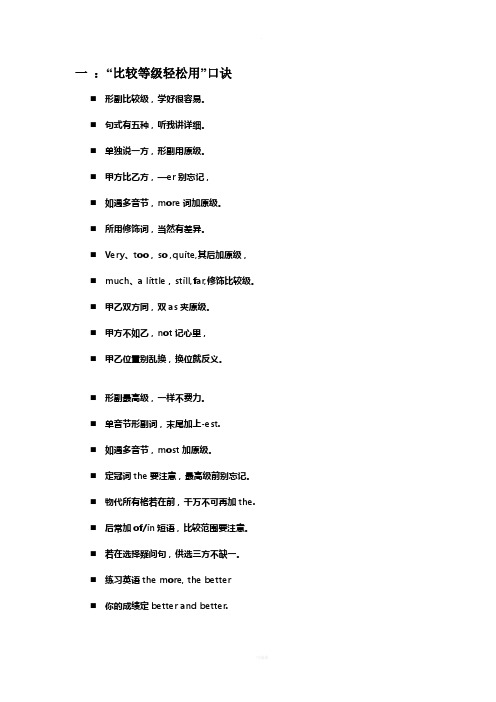
一:“比较等级轻松用”口诀⏹形副比较级,学好很容易。
⏹句式有五种,听我讲详细。
⏹单独说一方,形副用原级。
⏹甲方比乙方,—er别忘记,⏹如遇多音节,more词加原级。
⏹所用修饰词,当然有差异。
⏹Very、too,so ,quite,其后加原级,⏹much、a little,still,far,修饰比较级。
⏹甲乙双方同,双as夹原级。
⏹甲方不如乙,not记心里,⏹甲乙位置别乱换,换位就反义。
⏹形副最高级,一样不费力。
⏹单音节形副词,末尾加上-est.⏹如遇多音节,most加原级。
⏹定冠词the要注意,最高级前别忘记。
⏹物代所有格若在前,千万不可再加the.⏹后常加of/in短语,比较范围要注意。
⏹若在选择疑问句,供选三方不缺一。
⏹练习英语the more, the better⏹你的成绩定better and better.二,形容词比较等级级的构成1单音节词在词尾加er,est构成比较级, 最高级.cold —colder young— younger tall—tallershort—shorter high —higher new—newerold —older long—longer strong—strongerwarm—warmer cool—cooler small—smaller2.以字母e结尾的词只加r, st 构成比较级,最高级nice—nicer late—later fine—finer3.重读闭音节以一个辅音字母结尾的,应双写该辅音字母,再加er.、estbig—bigger hot—hotter thin —thinnerfat —fatter red—redder4。
以辅音字母+y结尾的词,先把y改为i,再加er , esteasy ——easier funny —— funnierearly —earlier happy — happierheavy——heavier5。
修饰比较级的词有哪些
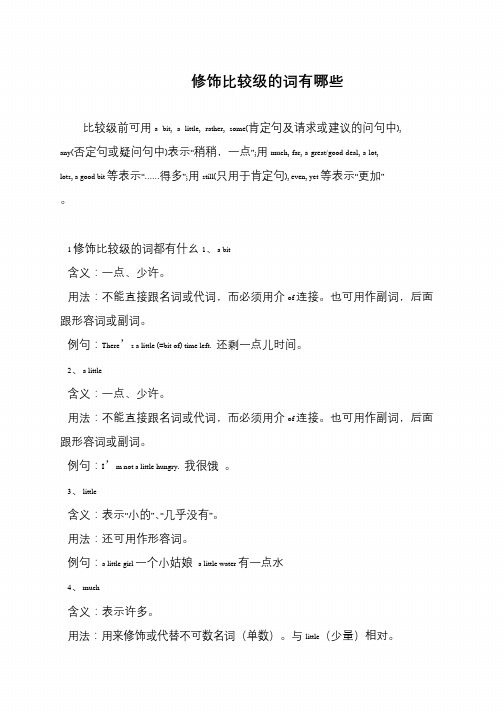
修饰比较级的词有哪些
比较级前可用a bit, a little, rather, some(肯定句及请求或建议的问句中),
any(否定句或疑问句中)表示“稍稍,一点”;用much, far, a great/good deal, a lot,
lots, a good bit 等表示“……得多”;用still(只用于肯定句), even, yet 等表示“更加”。
1 修饰比较级的词都有什幺1、a bit
含义:一点、少许。
用法:不能直接跟名词或代词,而必须用介of 连接。
也可用作副词,后面跟形容词或副词。
例句:There’s a little (=bit of) time left. 还剩一点儿时间。
2、a little
含义:一点、少许。
用法:不能直接跟名词或代词,而必须用介of 连接。
也可用作副词,后面跟形容词或副词。
例句:I’m not a little hungry. 我很饿。
3、little
含义:表示“小的”、“几乎没有”。
用法:还可用作形容词。
例句:a little girl 一个小姑娘a little water 有一点水
4、much
含义:表示许多。
用法:用来修饰或代替不可数名词(单数)。
与little(少量)相对。
副词形容词比较级最高级小口诀
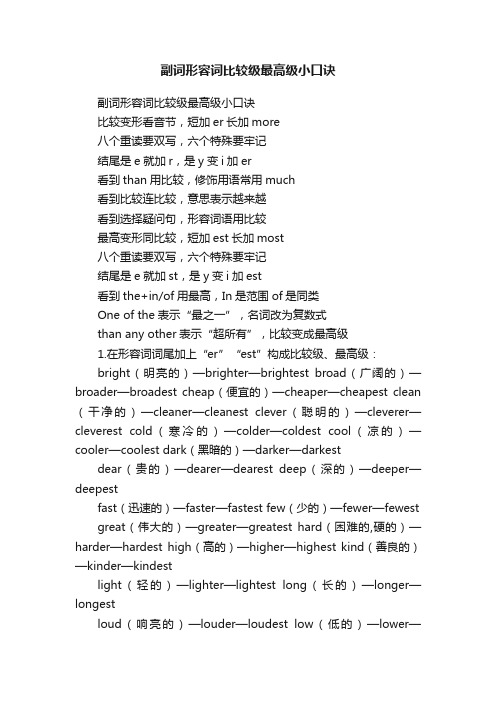
副词形容词比较级最高级小口诀副词形容词比较级最高级小口诀比较变形看音节,短加er长加more八个重读要双写,六个特殊要牢记结尾是e就加r,是y变i加er看到than用比较,修饰用语常用much看到比较连比较,意思表示越来越看到选择疑问句,形容词语用比较最高变形同比较,短加est长加most八个重读要双写,六个特殊要牢记结尾是e就加st,是y变i加est看到the+in/of用最高,In是范围of是同类One of the表示“最之一”,名词改为复数式than any other表示“超所有”,比较变成最高级1.在形容词词尾加上“er”“est”构成比较级、最高级:bright(明亮的)—brighter—brightest broad(广阔的)—broader—broadest cheap(便宜的)—cheaper—cheapest clean (干净的)—cleaner—cleanest clever(聪明的)—cleverer—cleverest cold(寒冷的)—colder—coldest cool(凉的)—cooler—coolest dark(黑暗的)—darker—darkestdear(贵的)—dearer—dearest deep(深的)—deeper—deepestfast(迅速的)—faster—fastest few(少的)—fewer—fewest great(伟大的)—greater—greatest hard(困难的,硬的)—harder—hardest high(高的)—higher—highest kind(善良的)—kinder—kindestlight(轻的)—lighter—lightest long(长的)—longer—longestloud(响亮的)—louder—loudest low(低的)—lower—lowestnear(近的)—nearer—nearest new(新的)—newer—newestpoor(穷的)—poorer—poorest quick(快的)—quicker—quickestquiet(安静的)—quieter—quietest rich(富裕的)—richer—richestshort(短的)—shorter—shortest slow(慢的)—slower—slowestsmall(小的)—smaller—smallest smart(聪明的)—smarter—smartest soft(柔软的)—softer—softest strong(强壮的)—stronger—strongest sweet(甜的)—sweeter—sweetest tall(高的)-taller-tallestthick(厚的)—thicker—thickest warm(温暖的)—warmer—warmest weak(弱的)—weaker—weakest young(年轻的)—younger—youngest 2.双写最后一个字母,再加上“er”“est”构成比较级、最高级:big(大的)—bigger—biggest fat(胖的)—fatter—fattesthot(热的)—hotter—hottest red(红的)—redder—reddestsad(伤心的)—sadder—saddest thin(瘦的)—thinner—thinnestwet(湿的)—wetter—wettest mad(疯的)—madder—maddest3.以不发音的字母e结尾的形容词,加上“r”、“st”构成比较级、最高级:able(能干的)—abler—ablest brave(勇敢的)—braver—bravestclose(接近的)—closer—closest fine(好的,完美的)—finer—finestlarge(巨大的)—larger—largest late(迟的)—later—latestnice(好的)—nicer—nicest ripe(成熟的)—riper—ripestrude(粗鲁的)—ruder—rudest safe(安全的)—safer—safeststrange(奇怪的)—stranger—strangest wide(宽广的)—wider—widestwise(睿智的,聪明的)—wiser—wisest white(白的)—whiter—whitest4.以字母y结尾的形容词,把y改为i,再加上“er”、“est”构成比较级、最高级:busy(忙碌的)—busier—busiest dirty(脏的)—dirtier—dirtiestdry(干燥的)—drier—driest early(早的)—earlier—earliesteasy(容易的)—easier—easiest friendly(友好的)—friendlier—friendliestfunny(好玩的)—funnier—funniest happy(开心的)—happier—happiest healthy(健康的)—healthier—healthiest heavy(重的)—heavier—heaviest hungry(饿的)—hungrier—hungriest lazy(懒惰的)—lazier—laziestlucky(幸运的)—luckier—luckiest naughty(调皮的)—naughtier—naughtiest noisy(嘈杂的)—noisier—noisiest pretty (美丽的)—prettier—prettiestsilly(傻的)—sillier—silliest spicy(辣的)—spicier—spiciest thirsty(渴的)—thirstier—thirstiest ugly(丑的)—uglier—ugliest5.双音节、多音节形容词,在单词前面加上“more”“most”构成比较级、最高级:afraid(害怕的)—more afraid—most afraid beautiful(美丽的)—more beautiful—most beautifulcareful(仔细的)—more careful—most carefulcheerful(开心的)—more cheerful—most cheerfulcrowded(拥挤的)—more crowded—most crowdeddangerous(危险的)—more dangerous—most dangerous delicious(美味的)—more delicious—most deliciousdifficult(困难的)—more difficult—most difficultexciting(令人兴奋的)—more exciting—most excitingexpensive(昂贵的)—more expensive—most expensivefamous(著名的)—more famous—most famousfrightened(受惊的)—more frightened—most frightened frightening(令人害怕的)—more frightening—most frighteninghard-working(勤奋的)—more hard-working—most hard-workinghelpful(有帮助的)—more helpful—most helpfulhonest(诚实的)—more honest—most honestimportant(重要的)—more important—most importantinteresting(有趣的)—more interesting—most interesting polite(有礼貌的)—more polite—most politeterrible(可怕的)—more terrible—most terribletired(累的)—more tired—most tired6.不规则变化的形容词:good(好的)/ well(好的)—better—bestbad(坏的)/ badly(坏的)/ ill(病的)—worse—worstmany(多的)/ much(多的)—more—mostlittle(少的)—less—leastold(老的)—older/ elder—oldest/ eldestfar(远的)—farther/ further—farthest furthest。
形容词比较级最高级的变化规则及口诀
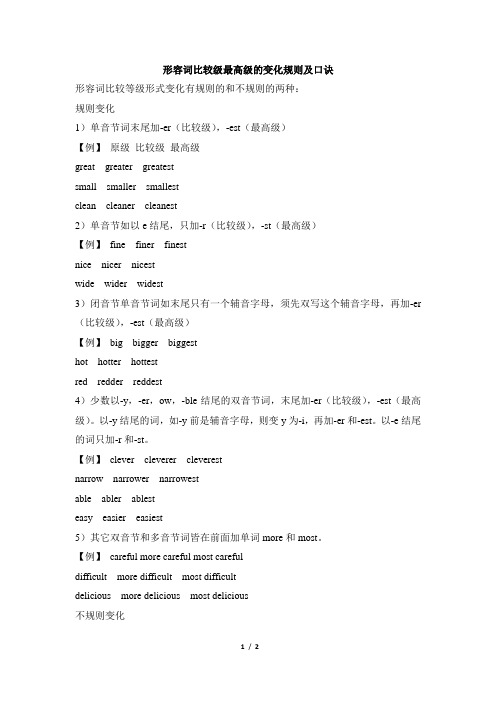
形容词比较级最高级的变化规则及口诀形容词比较等级形式变化有规则的和不规则的两种:规则变化1)单音节词末尾加-er(比较级),-est(最高级)【例】原级比较级最高级great greater greatestsmall smaller smallestclean cleaner cleanest2)单音节如以e结尾,只加-r(比较级),-st(最高级)【例】fine finer finestnice nicer nicestwide wider widest3)闭音节单音节词如末尾只有一个辅音字母,须先双写这个辅音字母,再加-er (比较级),-est(最高级)【例】big bigger biggesthot hotter hottestred redder reddest4)少数以-y,-er,ow,-ble结尾的双音节词,末尾加-er(比较级),-est(最高级)。
以-y结尾的词,如-y前是辅音字母,则变y为-i,再加-er和-est。
以-e结尾的词只加-r和-st。
【例】clever cleverer cleverestnarrow narrower narrowestable abler ablesteasy easier easiest5)其它双音节和多音节词皆在前面加单词more和most。
【例】careful more careful most carefuldifficult more difficult most difficultdelicious more delicious most delicious不规则变化原级比较级最高级good/well better bestbad worse worstmany/much more mostlittle less leastfar farther/further farthest/furthest注:有些形容词一般没有比较等级。
副词形容词比较级最高级小口诀

副词形容词比较级最高级小口诀比较变形看音节,短加er长加more八个重读要双写,六个特殊要牢记结尾是e就加r,是y变i加er看到than用比较,修饰用语常用much看到比较连比较,意思表示越来越看到选择疑问句,形容词语用比较最高变形同比较,短加est长加most八个重读要双写,六个特殊要牢记结尾是e就加st,是y变i加est看到the+in/of用最高,In是范围of是同类One of the表示“最之一”,名词改为复数式than any other表示“超所有”,比较变成最高级1.在形容词词尾加上“er”“est”构成比较级、最高级:bright(明亮的)—brighter—brightest broad(广阔的)—broader—broadest cheap(便宜的)—cheaper—cheapest clean(干净的)—cleaner—cleanest clever(聪明的)—cleverer—cleverest cold(寒冷的)—colder—coldest cool(凉的)—cooler—coolest dark(黑暗的)—darker—darkestdear(贵的)—dearer—dearest deep(深的)—deeper—deepestfast(迅速的)—faster—fastest few(少的)—fewer—fewestgreat(伟大的)—greater—greatest hard(困难的,硬的)—harder—hardest high(高的)—higher—highest kind(善良的)—kinder—kindestlight(轻的)—lighter—lightest long(长的)—longer—longestloud(响亮的)—louder—loudest low(低的)—lower—lowestnear(近的)—nearer—nearest new(新的)—newer—newestpoor(穷的)—poorer—poorest quick(快的)—quicker—quickestquiet(安静的)—quieter—quietest rich(富裕的)—richer—richestshort(短的)—shorter—shortest slow(慢的)—slower—slowestsmall(小的)—smaller—smallest smart(聪明的)—smarter—smartest soft(柔软的)—softer—softest strong(强壮的)—stronger—strongest sweet(甜的)—sweeter—sweetest tall(高的)-taller-tallestthick(厚的)—thicker—thickest warm(温暖的)—warmer—warmest weak(弱的)—weaker—weakest young(年轻的)—younger—youngest 2.双写最后一个字母,再加上“er”“est”构成比较级、最高级:big(大的)—bigger—biggest fat(胖的)—fatter—fattesthot(热的)—hotter—hottest red(红的)—redder—reddestsad(伤心的)—sadder—saddest thin(瘦的)—thinner—thinnestwet(湿的)—wetter—wettest mad(疯的)—madder—maddest3.以不发音的字母e结尾的形容词,加上“r”、“st”构成比较级、最高级:able(能干的)—abler—ablest brave(勇敢的)—braver—bravestclose(接近的)—closer—closest fine(好的,完美的)—finer—finestlarge(巨大的)—larger—largest late(迟的)—later—latestnice(好的)—nicer—nicest ripe(成熟的)—riper—ripestrude(粗鲁的)—ruder—rudest safe(安全的)—safer—safeststrange(奇怪的)—stranger—strangest wide(宽广的)—wider—widestwise(睿智的,聪明的)—wiser—wisest white(白的)—whiter—whitest4.以字母y结尾的形容词,把y改为i,再加上“er”、“est”构成比较级、最高级:busy(忙碌的)—busier—busiest dirty(脏的)—dirtier—dirtiestdry(干燥的)—drier—driest early(早的)—earlier—earliesteasy(容易的)—easier—easiest friendly(友好的)—friendlier—friendliestfunny(好玩的)—funnier—funniest happy(开心的)—happier—happiest healthy(健康的)—healthier—healthiest heavy(重的)—heavier—heaviest hungry(饿的)—hungrier—hungriest lazy(懒惰的)—lazier—laziestlucky(幸运的)—luckier—luckiest naughty(调皮的)—naughtier—naughtiest noisy(嘈杂的)—noisier—noisiest pretty(美丽的)—prettier—prettiestsilly(傻的)—sillier—silliest spicy(辣的)—spicier—spiciestthirsty(渴的)—thirstier—thirstiest ugly(丑的)—uglier—ugliest5.双音节、多音节形容词,在单词前面加上“more”“most”构成比较级、最高级:afraid(害怕的)—more afraid—most afraidbeautiful(美丽的)—more beautiful—most beautifulcareful(仔细的)—more careful—most carefulcheerful(开心的)—more cheerful—most cheerfulcrowded(拥挤的)—more crowded—most crowdeddangerous(危险的)—more dangerous—most dangerousdelicious(美味的)—more delicious—most deliciousdifficult(困难的)—more difficult—most difficultexciting(令人兴奋的)—more exciting—most excitingexpensive(昂贵的)—more expensive—most expensivefamous(著名的)—more famous—most famousfrightened(受惊的)—more frightened—most frightenedfrightening(令人害怕的)—more frightening—most frighteninghard-working(勤奋的)—more hard-working—most hard-workinghelpful(有帮助的)—more helpful—most helpfulhonest(诚实的)—more honest—most honestimportant(重要的)—more important—most importantinteresting(有趣的)—more interesting—most interestingpolite(有礼貌的)—more polite—most politeterrible(可怕的)—more terrible—most terribletired(累的)—more tired—most tired6.不规则变化的形容词:good(好的)/ well(好的)—better—bestbad(坏的)/ badly(坏的)/ ill(病的)—worse—worstmany(多的)/ much(多的)—more—mostlittle(少的)—less—leastold(老的)—older/ elder—oldest/ eldestfar(远的)—farther/ further—farthest furthest。
修饰比较级的词有哪些 有什么用法
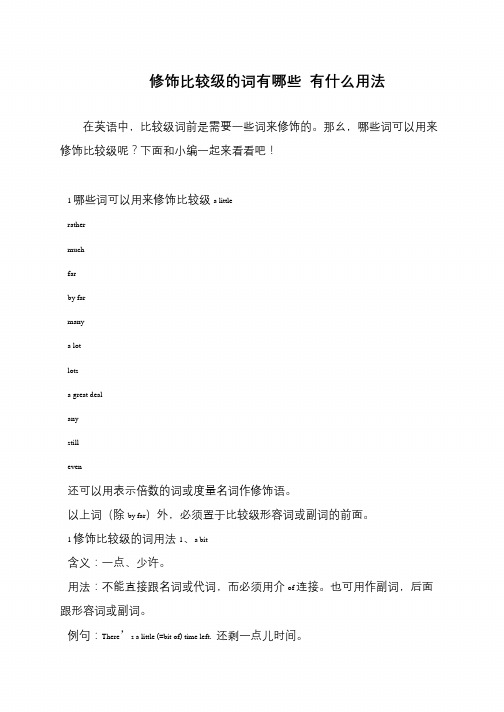
修饰比较级的词有哪些有什么用法
在英语中,比较级词前是需要一些词来修饰的。
那幺,哪些词可以用来修饰比较级呢?下面和小编一起来看看吧!
1 哪些词可以用来修饰比较级a little
rather
much
far
by far
many
a lot
lots
a great deal
any
still
even
还可以用表示倍数的词或度量名词作修饰语。
以上词(除by far)外,必须置于比较级形容词或副词的前面。
1 修饰比较级的词用法1、a bit
含义:一点、少许。
用法:不能直接跟名词或代词,而必须用介of 连接。
也可用作副词,后面跟形容词或副词。
例句:There’s a little (=bit of) time left. 还剩一点儿时间。
形容词及比较级用法顺口溜word版本

形容词、副词"级别"口诀I.变比较级形式前有甲、后有乙中间来个比较级。
比较级前用个be,比较级后用个"比"(than)。
原级变成比较级,er结尾要牢记;一般情况直接加,单辅重闭双写加;辅音加y变i加,以e结尾去e加;少数部分双音节,规则如同单音词。
其余双音多音节,词前加more就可以;不规则词没几个,它们需要特殊记。
II.变最高级形式最高级,也容易,原级后面加est,规则类同比较级,提醒一点便可以;其余双音、多音节,前加most牢牢记。
还有一点要留意,最高级前要用the;若是副词最高级,用不用the皆可以。
III.变不规则形式合二为一有三对,"病坏""两多"与"两好",①一分为二有两个,一个"远"来一个"老"。
②还有一个双含义,只记"少"来别记"小"。
③注:①ill/ bad→worse→worst; many/ much→more→most; good/well→better→best②far→farther/further→farthest/furthest; old/older/elder→oldest/ eldest③little→less→least形容词比较等级形容词最高级前不加the的情况在句中使用形容词最高级时,一般要加定冠词the.但以下几种情况,最高级之前不加定冠词。
一、如果形容词最高级用来加强语气,表示"非常、极其"的意思时,前面一般不用定冠词,但有时可以加不定冠词。
例如:He is a most careful student in our class. 他是我们班上一个非常细心的学生。
She is in closest touch with us .她和我们保持非常密切的联系。
形容词比较级构成方法的记忆歌诀

二、形容词比拟级构成方法的记忆歌诀:两者之间作比拟,尾巴er少不了;一般词尾加er,有e词尾加r;单一辅音单音节,双写词尾加er辅音加y很重要,去y变i加er遇到双音和多音,最高级most放前最适宜。
三、形容词、副词比拟级和最高级局部用法歌诀:1.两者和三者、三者以上:两者比拟用than连接,三者比拟the在前;2.同级比拟歌诀:同级比拟用原级as…as…永不离,假设是否认加notas…as…否在前as…as…加not 只说两者有区别so…as…加not 后者总是强前者3.比拟级前常可放以下表修饰和程度的词:a little稍微, much得多, even更、还要,far得多, still要、还要, a lot, 得多rather相当。
四、形容词和副词比拟级、最高级的用法强调:定冠词在形容词最高级中使用但是在副词最高级中往往省略不用。
一. 写出以下各形容词的比拟级和最高级:1. nice _________2. fat _________3. slow _________4. dry _________5. happy _________6. wet _________7. much _________8. ill_________9. little _________ 10. bad _________11. thin _________12. far _________ 13. early _________ 14. careful________ 15. e*citing_______16.well______17.friendly________ 18. green_________ 19. few________ 20.busy_______二. 根据句意,用所括号所级形容词的比拟等级形式填空:1. mr. smith is _________ man in this office. (rich)2. winter is _________ season of the years. (cold)3. this radio is not so ________ as that one. (cheap)4. it is much _______ today than yesterday. (hot)5. she is a little ________ than her classmates. (careful)6. ________ people came to the meeting than last time. (many)7. which book is ________, this one or that one? (easy)8. my room is _______ than yours. (small)9. hainan is _______ from beijing than hunan. (far)10. skating is ___________ than swimming. (e*citing)11. jim is _______ than all the others. (honest)12. things are getting _______ and _______. (bad)13. the higher you climb, the _______ it will be. (cold)14. now our lives are being _________ and __________. (good)15. there are _______ boys than girls in our class. (few)16.the _______(hard) you work, the ________(happy) your parents will be.17.he is __________(tall) of the two.18.of all the subjects, he likes english _______(well).19.he runs __________(fast) of the three.20.he got _________(good) grades in his class.三、用适当形式填空:1. bob is _________ ( young ) than fred, but ___________ (tall) than fred.2. jim is not as ___________ (tall) as jack.3. almost all the students' faces are the samebut li deming looks _______ (fat) than before after the summer holidays.4.which is _________ (heavy), the hen or the chicken?5.-- how _________ (tall) is sally?-- she' s 1.55 metres ________ (tall). what about *iaoling?-- she' s only 1.40 metres ________ (tall).she is much _______ (short) than sally.she is also the _______ (short) girl in the class.6. he is ______ (bad) at learning maths. he is much _______ (bad) at chinese and he is the _________ (bad) at english.7. annie says sally is the ________ (kind) person in the world.8. he is one of the_________(friendly) people in the class, i think.9. a dictionary is much _________ (e*pensive) than a story-book.10. an orange is a little ______ (big) than an apple, but much ________ (small) than a watermelon.11. the changjiang river is the _______ (long) river in china.12. sue is a little ___________ (beautiful) than her sister.13. my room is not as _________ (big) as my brother' s.14.--how difficult is physics? --i' m not sure.-- is it ________ (difficult) than maths? -- I don’t think so.15.-- annie plays the piano very _________ (well).-- sue plays it _____ (well) than annie. and sally plays it the ______ (well).16. saturday is my _________ (busy) day in a week.17. her mother is getting ____________ (fat) and ________ (fat).18. i think it’s too e*pensive. i' d like a _____________ (cheap) one.19. he es to school much ____________ (early) than i.20. this book is not as _____________ (interesting) as that one.21. your classroom is __________ (wide) and ___________ (bright) than ours.22. practise as __________ (much) as you can.23. the ________ (much), the ____________ (good).24. nowadays(现在) english is __________( important )than any other subject, 1 think.25. most of the students think a lion is much ________ (dangerous) than a bear and it is the __________ (dangerous) animal in the world26. my brother is two years __________ (old) than me.27. tom is as ________(fat) as jim.28. is your sister __________(young) than you? yes,she is.29. who is ___________(thin),you or helen? helen is.30. whose pencil-bo* is __________(big),yours or hers? hers is.31. mary’s hair is as __________(long) as lucy’s.32.ben ______ (jump) ________ (high) than some of the boys in his class.33.________ nancy sing __________ (well) than helen? yes, she _____.34.fangfang is not as _________ (tall) as the other girls.35.my eyes are __________(big) than ________ (she)..36.which is ___________(heavy),the elephant or the pig?37.who gets up _________(early),tim or tom?38._____the girls get up_______(early) than the boys?no,they______.39. jim runs _____(slow). but ben runs _____(slow).40.the child doesn’t______(write) as ____(fast) as the students.41.he is as________(careful) as me, but mary doesn’t do her homework as______as me.四. 用of, than, in, as填空。
比较级变化口诀
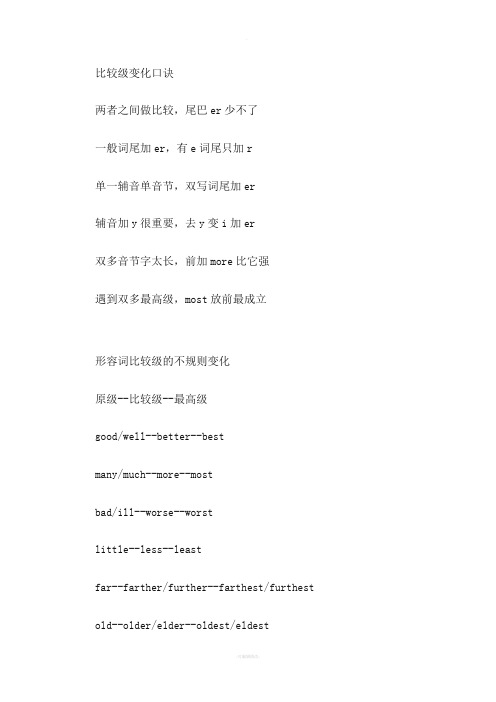
little--less--least
far--farther/further--farthest/furthest
old--older/elder--oldest/eldest
欢迎您的下载,
资料仅供参考!
致力为企业和个人提供合同协议,策划案计划书,学习课件等等
比较级变化口诀两者之间做比较尾巴er少不了一般词尾加er有e词尾只加r单一辅音单音节双写词尾加er辅音加y很重要去y加er双多音节字太长前加more比它强遇到双多最高级most放前最成立形容词比较级的不规则变化原级比较级最高级goodwellbetterbestmanymuchmoremostbadillworseworstlittlelessleastfarfartherfurtherfarthestfurthestoldolderelderoldesteldest
打造全网一站式需求
比较级变化口诀
两者之间做比较,尾巴er少不了
一般词尾加er,有e词尾只加r
单一辅音单音节,双写词尾加er
辅音加y很重要,去y变i加er
双多音节字太长,前加more比它强
遇到双多最高级,most放前最成立
形容词比较级的不规则变化
原级--比较级-Biblioteka 最高级good/well--better--best
many/much--more--most
【英语单词记忆】形容词比较级的记忆口诀
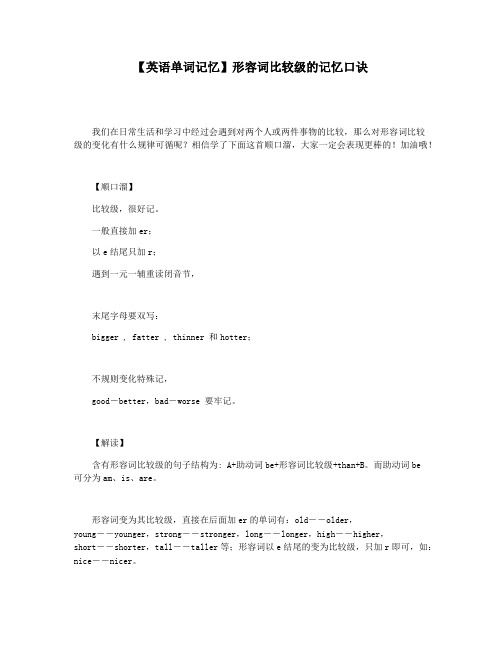
【英语单词记忆】形容词比较级的记忆口诀我们在日常生活和学习中经过会遇到对两个人或两件事物的比较,那么对形容词比较级的变化有什么规律可循呢?相信学了下面这首顺口溜,大家一定会表现更棒的!加油哦!【顺口溜】比较级,很好记。
一般直接加er;以e结尾只加r;遇到一元一辅重读闭音节,末尾字母要双写:bigger , fatter , thinner 和hotter;不规则变化特殊记,good―better,bad―worse 要牢记。
【解读】含有形容词比较级的句子结构为: A+助动词be+形容词比较级+than+B。
而助动词be可分为am、is、are。
形容词变为其比较级,直接在后面加er的单词有:old――older,young――younger,strong――stronger,long――longer,high――higher,short――shorter,tall――taller等;形容词以e结尾的变为比较级,只加r即可,如:nice――nicer。
【开心训练营】1、The big tree is ______ than the small flower.A. tallB. tallerC. tallr2、Look! The elephant is _____ than the monkey.A. fatB. thinC. fatter3、Lingling has got ninety―seven points, Sam has got one hundred points. Sam is _____ than Lingling.A. goodB. betterC. worse【名人名言】Activity is the only road to knowledge .行动是通往知识的唯一道路感谢您的阅读,祝您生活愉快。
- 1、下载文档前请自行甄别文档内容的完整性,平台不提供额外的编辑、内容补充、找答案等附加服务。
- 2、"仅部分预览"的文档,不可在线预览部分如存在完整性等问题,可反馈申请退款(可完整预览的文档不适用该条件!)。
- 3、如文档侵犯您的权益,请联系客服反馈,我们会尽快为您处理(人工客服工作时间:9:00-18:30)。
修饰比较级的词有哪些口诀是什么
比较级前用个be,比较级后用个”比”(than)。
原级变成比较级,er 结尾要牢记;一般情况直接加,单辅重闭双写加;辅音加y 变i 加,以e 结尾去e 加;少数部分双音节,规则如同单音词。
其余双音多音节,词前加more 就可以;不规则词没几个,它们需要特殊记。
1 比较级前面的修饰1)a bit,a little,rather,much,far,by far,many,a lot,lots,a
great deal,any,still,even 等
2)还可以用表示倍数的词或度量名词作修饰语.
3)以上词(除by far)外,必须置于比较级形容词或副词的前面.many,old 和far
1)如果后接名词时,much more 不可数名词
many more 可数名词复数
2)old 有两种比较级和最高级形式:older/oldest 和elder/eldest.elder,eldest
只用于兄弟姐妹的长幼关系.
My elder brother is an engineer.
Mary is the eldest of the three sisters.
3)far 有两种比较级,farther,further.在英语中两者都可指距离.在美语中, father 表示距离,further 表示进一步.
I have nothing further to say.
the 最高级比较范围
1)The Sahara is the biggest desert in the world.。
